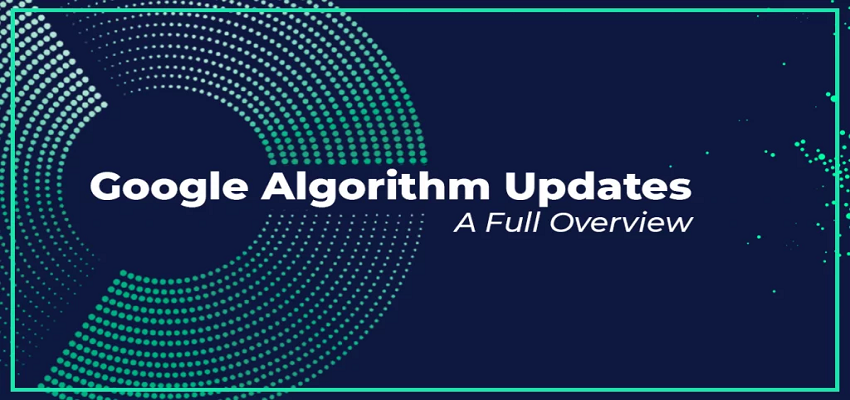The Latest Google Algorithm Updates: A Comprehensive Overview

Google’s commitment to delivering relevant and high-quality search results has led to its regular updates of search algorithms. These updates aim to enhance the user experience by improving search result accuracy and combating spammy practices. In this article, we will explore some of the latest Google algorithm updates and their potential impact on website rankings. Understanding these updates is crucial for website owners, digital marketers, and SEO professionals to ensure their strategies align with Google’s guidelines.
- Core Algorithm Updates :
Google’s core algorithm updates are broad changes that affect search rankings across various industries and niches. These updates often involve significant changes to how Google evaluates and ranks web pages. Here are some notable core algorithm updates from recent years:
Google Medic Update (August 2018) :
- This update primarily impacted medical and health-related websites. It focused on evaluating the expertise, authority, and trustworthiness (E-A-T) of these sites’ content. Websites with low E-A-T scores saw a decline in rankings, while those with high-quality and authoritative content experienced improvements.
Google BERT Update (October 2019) :
- BERT (Bidirectional Encoder Representations from Transformers) aimed to better understand the context of search queries by considering the surrounding words. It allowed Google to provide more relevant results by understanding the intent behind long-tail and complex search queries.
Google May 2020 Core Update :
- This update introduced significant changes to search rankings across various industries. It emphasized the importance of user-focused content, expertise, and user experience. Websites providing valuable and relevant content to users were rewarded, while those with thin or low-quality content were negatively affected.
- Specific Updates :
Apart from core algorithm updates, Google also introduces specific updates targeting particular aspects of websites or user experiences. Here are a few noteworthy updates:
Mobile-First Indexing :
- With the increasing importance of mobile devices, Google has been gradually shifting towards mobile-first indexing. This means that Google primarily considers a website’s mobile version for indexing and ranking purposes. Website owners must ensure their websites are mobile-friendly to maintain and improve their search rankings.
Page Experience Update (June 2021) :
- Google introduced the Page Experience Update, which incorporated Core Web Vitals as ranking factors. Core Web Vitals measure website loading speed, interactivity, and visual stability. Websites that provide a smooth and pleasant user experience are more likely to rank higher in search results.
Passage Indexing :
- Google plans to introduce Passage Indexing, which aims to rank specific passages within a webpage. This update allows Google to identify and rank relevant passages even if the overall page might not be highly optimized. It provides an opportunity for websites to gain visibility for specific topics or queries addressed within their content.
III. Adapting to Algorithm Updates :
As Google continues to update its algorithms, it’s crucial for website owners and SEO professionals to adapt their strategies accordingly. Here are a few key considerations:
Focus on User Experience :
- Creating a positive user experience by improving page load times, mobile-friendliness, and overall site performance is vital. Optimizing website design, navigation, and content readability enhances user engagement and satisfaction.
Quality Content and E-A-T :
- Producing high-quality, informative, and authoritative content is crucial. Expertise, Authority, and Trustworthiness (E-A-T) are key factors in Google’s evaluation of content. Focus on providing accurate information, citing reputable sources, and demonstrating expertise in your field.
Regular SEO Audits :
- Conducting regular SEO audits helps identify areas for improvement. Assess your website’s technical aspects, content relevance, backlink profile, and user experience. Fixing any issues and staying up to date with SEO best practices can positively impact your website’s rankings.
Conclusion :
Keeping up with Google’s algorithm updates is essential for website owners and SEO professionals. By understanding the latest changes, adapting strategies, and prioritizing user experience and quality content, websites can maintain or improve their search rankings. Regular monitoring of algorithm updates, industry news, and reputable SEO sources will help businesses stay ahead and succeed in the ever-evolving world of search engine optimization.
To stay informed about the latest Google algorithm updates in 2023, I recommend following reputable SEO news sources, subscribing to Google’s official webmaster blog, and actively engaging in the SEO community. These resources will provide you with up-to-date information and insights regarding any algorithm changes or updates introduced by Google.
Additionally, it’s valuable to stay informed about broader trends and principles that guide Google’s algorithm updates. Some general areas of focus for Google include:
- User Experience: Google places great emphasis on providing search results that deliver a positive user experience. Factors such as page speed, mobile-friendliness, ease of navigation, and overall user satisfaction are likely to remain important in future algorithm updates.
- Quality Content: High-quality, relevant, and authoritative content has always been a priority for Google. Creating unique, valuable content that satisfies user search intent is crucial for maintaining and improving search rankings.
- E-A-T: Expertise, Authority, and Trustworthiness (E-A-T) continue to be important signals for Google. Demonstrating expertise in your field, building authority through reputable links and mentions, and establishing trust with users contribute to a website’s overall reputation.
- User Intent: Understanding and matching user intent is essential for ranking well in search results. Google aims to provide searchers with the most relevant results based on their intent, so aligning your content with user needs is crucial.
While I can’t provide specific details about future algorithm updates, monitoring these core principles and staying informed about industry trends will help you adapt your SEO strategies effectively.
Remember, SEO is an ongoing process, and keeping up with the latest algorithm updates and best practices is key to maintaining and improving your website’s visibility in search results.